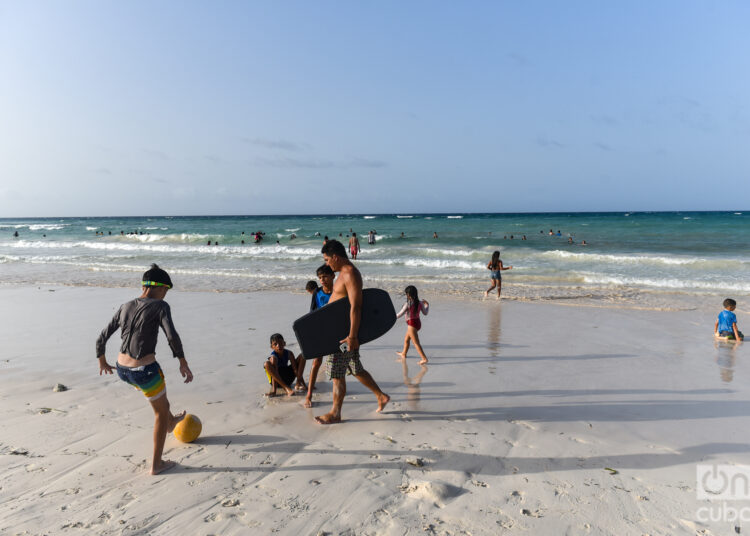Although Cuba is, due to its climate, an eternal summer, the months of July and August are the calendar period when most of us plan our vacations, because they also coincide with the school break, and this forces families to organize their leisure and recreation time around those dates.
I make my own plans too. Initially, I’m leaning toward the Dominican Republic, which doesn’t have the same beaches as Cuba, but the service is incomparably better: the entertainment options are greater and more varied, and, best of all, the Dominicans are a noble, welcoming, and cheerful people.
Some in Cuba will be upset by what I’m saying, and that reminds me of what someone once said to me: “I scold you because I love you; otherwise, I wouldn’t care.”
Speaking with an experienced Dominican Republic hotelier, he told me he didn’t understand how Cubans, with their all-inclusive package, keep guests in hotels. This increases consumption and expenses.
Promoting a wide and good non-hotel offering, which benefits not only hoteliers but also the community and, ultimately, the country, would allow for greater income and make the destination more attractive.
I’m no expert on the subject, but I think he’s right. Our tourism, compared to Dominican tourism, is more like sanatorium tourism.
Another thing is that not everyone can choose a vacation in the Dominican Republic or even a Cuban hotel. The rest of the options are practically nonexistent, from modest campsites to recreational areas, both in the city and on the outskirts.
“But shoemaker, stick to your last,” and this isn’t because I think new forms of management are the ultimate solution, although they are undoubtedly part of it, and, because that’s “my shoe”, I always refer to them in the context of the topic I’m addressing.
Stimulating the tourism market
I believe that our non-state forms of management can greatly contribute to the effort to stimulate our tourism market and can add elements that make it richer and more attractive to international tourism and to our fellow citizens.
However, this possible alternative faces many obstacles, first and foremost, internal obstacles.
Among the activities prohibited in the sector are:
Camping activities, RV parks and caravan parks; provision of accommodation in campsites, recreational camps and hunting and fishing camps for short stays; rental and leasing of recreational and sports equipment. Exceptions include bicycle rentals, billiards, and other games;
Travel agency and tour operator activities. Activities primarily dedicated to selling travel, package tours, transportation, and accommodation services to the general public and commercial clients. The organization of travel service packages for sale through travel agencies or tour operators, which may include one or more of the following elements: transportation, accommodation, meals, visits to museums, historical or cultural sites, and attendance at theatrical, musical, or sporting events.
Reservation services and related activities, including the provision of other travel-related reservation services: among others, transportation, hotel, restaurant, car rental, entertainment and sports reservations; provision of timeshare services; ticket sales activities for theater performances, sports competitions, and other entertainment activities;
Provision of visitor assistance services: providing clients with travel information and tour guide activities, and tourism promotion activities. Exceptions include those who perform accommodation management linked to landlords of apartments or rooms, passenger management at car pool, and transportation management for passengers for non-tourist purposes.
In short, as we say in Cuba, for the Cuban private sector, tourism, both international and domestic, “is crap”…. It can’t be touched.
And why not?
I’m not going to address the benefits that its integration may have; I’ve already talked about that. I’m going to address two elements in particular.
Those of us who are veterans in these battles know that most of the travel agencies created in the country were operated by Cuban nationals, acting as fronts for foreign businesspeople, or as we called them, freelancers. In short, tourism in Cuba was driven by Cubans.
Secondly, something that hits close to home for me: the prohibition against Cuban MSMEs dedicated to tourism from organizing themselves international events in the country. Something we all yearn for, and which we unfortunately choose to do abroad because it’s easier and more viable, thereby failing to bring significant revenue to the country.
We can talk much more about this issue, but in short, I want to say the same thing as always: that many of the solutions or alternatives are in our hands, and actively integrating the non-state sector of the economy into international and domestic tourism activities is one of them. As I always say, why not?
________________________________________
*This text was originally published on the author’s Facebook account. It is reproduced with his express permission.











An important step in Viet Nam’s very successful model of a market economy with socialist characteristics was enabling the private sector in tourism.
There is a phenomenal difference between today and the situation during my early visits to Viet Nam. In the 1990s because of doi moi (renovation), “Tourism business was opened to various types of enterprises (e.g. collective, private-owned, family-run, and foreign-invested). Some state-owned enterprises were reformed…the GOV’s role of entrepreneur thus slightly weakened, while its roles of regulator and promoter were intensified”…”In 1994, the number of foreign tourists to Vietnam was one million , a fourfold increase as compared to 1990. From 1991 to 2004, the number of foreign tourists increased nearly 10 times, from 300,000 to 2.9 million”
https://www.researchgate.net/publication/278031423_The_evolution_of_tourism_policy_in_Vietnam_1960-2015
Cuba constantly expresses its closeness to and admiration of Viet Nam. It is time to go beyond rhetoric. Tourism is a good place to start. The exclusion of the tourism sector from small and medium enterprises and the refusal to even license private guides are symptoms of Cuba’s larger problems.